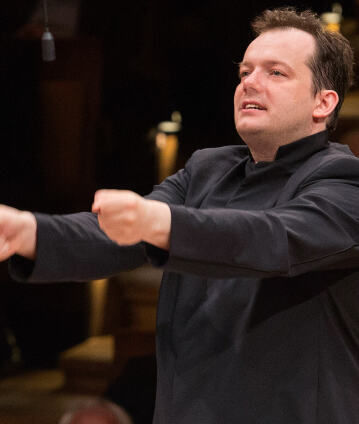Andris Nelsons conducts the “Symphonie fantastique”

Fanatical love, drug rapture, execution: there’s hardly an extreme experience that Hector Berlioz’s Symphonie fantastique leaves out. At the same time, the feverish expressivity is based on a cleverly calculated use of a tremendously large orchestra. In addition, Andris Nelsons and the Berliner Philharmoniker are presenting Debussy’s dreamy Prélude à l’après-midi d’un faune and Edgard Varèse’s orchestral work Arcana, which conjures up cosmic forces, on this French programme.
“Only when I heard Prélude à l’après-midi d’un faune for the first time did I realize what music really is.” None other than Maurice Ravel said that about Claude Debussy’s epoch-making masterpiece, based on the poem of the same name by Stéphane Mallarmé. His artful play with timbres rang in modernism in music: “Music began to draw new breath with the flute of the faun” (Pierre Boulez). The audience at the premiere was enthusiastic about the piece: “There was a vast silence in the hall as I ascended to the podium and our splendid flutist, Barrère, unfolded his opening line,” the evening’s conductor, Gustave Doret, recalled. “All at once I felt behind me […] an audience that was totally spellbound. It was a complete triumph.” The music, whose iridescent sound images evoke the world of ancient Arcadia conveyed by the poetry, was so wildly applauded that it had to be repeated.
At this guest appearance in 2016, Andris Nelsons, who has regularly conducted the Berliner Philharmoniker since his debut in October 2010, placed Debussy’s Prélude at the beginning of a French evening. The shooting star on the classical music scene – appointed the new Kapellmeister at Leipzig’s Gewandhaus (thus following in the footsteps of Felix Mendelssohn Bartholdy, Arthur Nikisch, Wilhelm Furtwängler and Bruno Walter) only one year after his leap to heading up the Boston Symphony Orchestra – then addresses Edgard Varèse’s magnum opus Arcana, a visionary homage to the doctor, philosopher and alchemist Paracelsus: “arcana” are those substances which aid in opening up worlds that are actually beyond human access.
The main symphonic work on the two evenings is Hector Berlioz’s burlesque Symphonie fantastique, which as a “fantastic tale” plays in the imaginary world of an imaginary musician “of pathological sensitivity” who, “convinced that his love is unappreciated,” poisons himself with opium (Berlioz). The work ends with Songe d’une Nuit du Sabbat, a “bizarre night piece” (Heinrich Heine) which could not be explained using the form criteria developed until then. We can particularly look forward to Nelsons’ impulsive interpretation: his infectious enthusiasm for music when conducting seems to know no yesterday and no tomorrow! “Compared to the Witches’ Sabbath,” wrote the Allgemeine musikalische Zeitung in 1843, “[…] Weber’s Wolf’s Glen is a lullaby.”
© 2016 Berlin Phil Media GmbH
Artists
Our recommendations
- Andris Nelsons and Baiba Skride make their debuts with the Berliner Philharmoniker
- Andris Nelsons conducts Mozart, Wagner and Shostakovich
- Andris Nelsons conducts Mahler’s Second Symphony
- Andris Nelsons and Daniil Trifonov
- Andris Nelsons conducts Strauss’s “Alpine Symphony”
- Andris Nelsons conducts Tchaikovsky at the Waldbühne